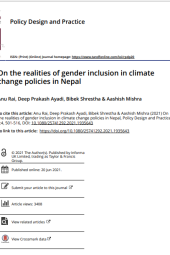On the Realities of Gender Inclusion in Climate Change Policies in Nepal
Summary
The document highlights that climate change impacts are not evenly distributed globally, and even among the most vulnerable groups, women bear a disproportionate burden of its effects. The review focuses on how climate change and related policy documents in Nepal address the gender-specific impacts of climate change. The policies are evaluated from a gender perspective to determine if they are gender-blind or gender-aware. In this document, a total of 24 documents were reviewed, covering climate change as a thematic area, as well as other climate change-related national policies on the environment, forestry, watershed, agriculture, and disaster. Among these, 19 documents were found to be gender-aware, meaning they take into account gender-specific impacts and considerations. However, five documents were identified as gender-blind, neglecting the gender differences in climate change impacts.
The document recommends the development of gender-transformative policies. It stresses the importance of addressing prevailing structural inequalities to enable vulnerable groups to effectively adapt to the impacts of climate change.
Categories:
Legal Document
Sub-Categories:
Policy
Publisher:
Routledge Taylor and Francis Group
Published Year:
2021
